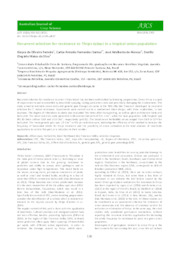Recurrent selection for resistance to Thrips tabaci in a tropical onion population.
Recurrent selection for resistance to Thrips tabaci in a tropical onion population.
Author(s): FERREIRA, G. de O.; SANTOS, C. A. F.; ALENCAR, J. A. de; SILVA, D. O. M. da
Summary: Recurrent selection for resistance to onion Thrips tabaci has not been well studied by breeding programmes. Onion thrips is a pest of major concern and is controlled by insecticide spraying, raising production costs and potentially damaging the environment. This study aimed to estimate onion bulb yield genetic gain through six cycles in the ‘BRS Alfa São Francisco’ developed by recurrent selection for T. tabaci resistance. Experiments were carried out in a randomised block design, with three replications, in two locations. The degree of infestation in plants was evaluated five times after transplanting, as well as plant architecture traits and bulb yield. The latest selection cycle presented bulb commercial yield of 32.1 t.ha-1 , while the base population ‘Alfa Tropical’ and IPA 10 check cultivar 15.9 and 14.0 t.ha -1, respectively (p<0.01). The broad sense heritability values ranged from 0.65 to 0.74 for bulb yield. The mean genetic gain was 1.0 t.ha-1 or 6% per selection cycle, indicating the efficiency of the method to increase the frequency of favourable alleles for thrips resistance and the possibility of onion cultivation in the total absence of insecticide applications to control this pest, or a reduction in their number.
Publication year: 2021
Types of publication: Journal article
Unit: Embrapa Semi-arid Region
Observation
Some of Embrapa's publications are published as ePub files. To read them, use or download one of the following free software options to your computer or mobile device. Android: Google Play Books; IOS: iBooks; Windows and Linux: Calibre.
Access other publications
Access the Agricultural Research Database (BDPA) to consult Embrapa's full library collection and records.
Visit Embrapa Bookstore to purchase books and other publications sold by Embrapa.

